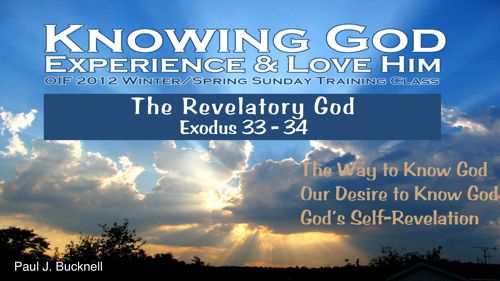
Knowing God: Experience & Love Him
The Revelatory God
Paul J. Bucknell
Way to Know God | God's Facebook | Purpose of Life | Distortion of Good Works | Spiritual Development | Desire to Know God | Call Upon | Exodus 34:6-7 | God's Character | God and Religions
Chapter #2 The Revelatory God: Handout pdf | Video
For pdf | epub | ppt | Audio mp3, check out the D3 Library
Knowing God Series Index
Series Introduction| Knowing God | The Revelatory God | Goodness of God | Holiness of God | Power of God | Omnipresent God | Exalted God | Faithfuness of God | Wisdom of God | Mercy of God | Wrath of God | Love of God | Sovereignty of God | Providence of God
The Way to Know Go (cont.)
Spiritual Development
Purpose: God is concerned with our growth just as new parents want their child to grow and develop. The church has disastrously focused on spiritual birth apart from the more grand purpose of spiritual development.
Once spiritual rebirth occurs, then we can grow in our relationship with God. Like a child in a family, we will see that individual and that individual’s way of relating to others develops.
As a family member, everyone gets to start seeing what ways the child is like his parents. The same is true with believers being like the Lord.
One of the greatest flaws of the church is to identify giving people eternal life as what God most seeks for. We emphasize getting people saved.
This is the miscarriage of the evangelicalism movement. The church is often like a Mom who struggled so hard to have a baby, named her, took pictures, showed her off and then no longer cared for her.
God’s purpose for giving us new life is to bring us into His family. He wants to grow us in relationship with Him. That is where all the joy in Christianity comes from. In the diagram below, you will see there are three stages of Christian growth that are often referred to in the scriptures. This particular image comes from 1 John 2:12-14.

Once spiritual rebirth occurs, then we can grow in our relationship with God. Like a child in a family, we will see that individual and that individual’s way of relating to others develops. John mentions the infant, teen and adult.
At each stage, we are acquiring different skills and knowledge of God’s Word, but more than this. It is predominantly developing our love and trust for God. The third stage, is not a dull time of existence, but one of consistent and persistent growth in our relationship with God.
John says, “I am writing to you, fathers, because you know Him who has been from the beginning” (1 John 2:13).
Notice how John, the closest disciple to Jesus, would describe God here, “Him who has been from the beginning.” He leaves out all the adjectives that would describe God.
He does not mean God evolves or changes, but that our understanding of Him grows and matures. Christian growth is largely getting to know more of God and allowing that and His purposes to shape our own lives.
This series on knowing God hopefully will spur us on in the right direction. We must regularly check ourselves, though. Ask, “Am I just learning things about God or am I more deeply appreciating God for knowing these things about Him.
Assignment
-
Why are you studying about knowing God?
-
Name at least one way you have allowed what you are learning to further appreciate His work in your life.
The Quest to know God
Many religions and philosophies are trying to understand the mystery of the universe, meaning of life, perplexity of suffering and resolving the inner tension of guilt.
Gautama struggled a good part of his life trying to understand all these things and especially why people suffer great disappointment.
He like others sought gurus in northeast India and yet could not find the explanation of suffering. He even spend seven years in extreme self-deprivation as a hermit, almost killing himself. This is the reason you will find pictures of a skinny Buddha.
It is unfortunate that he didn’t have the scriptures available to him. It would have explained suffering and much more. Instead we have Buddhism capturing many millions of adherents in wrong ideas of Buddha, for Gautama himself said he was no god and should not be worshipped.
Explanations for life come as we understand God and His purposes.
Without knowing Him, we cannot understand His works.
info@foundationsforfreedom.net
Scriptures typically quoted from the New American Standard Bible unless noted: (C) Copyright The Lockman Foundation 1988










